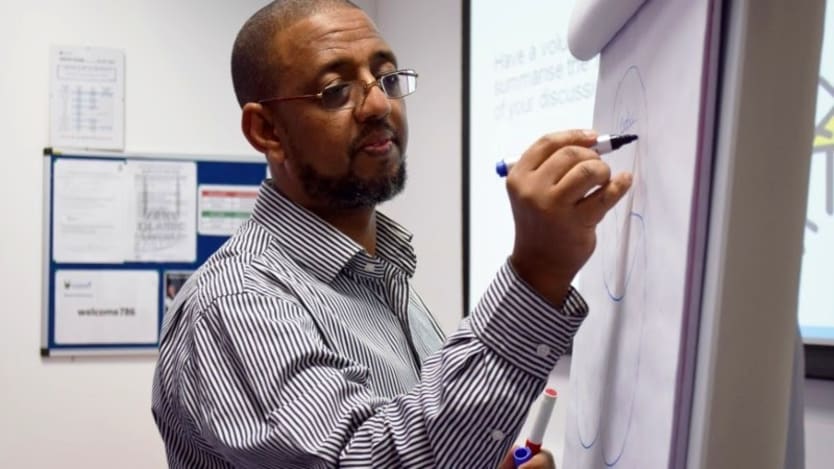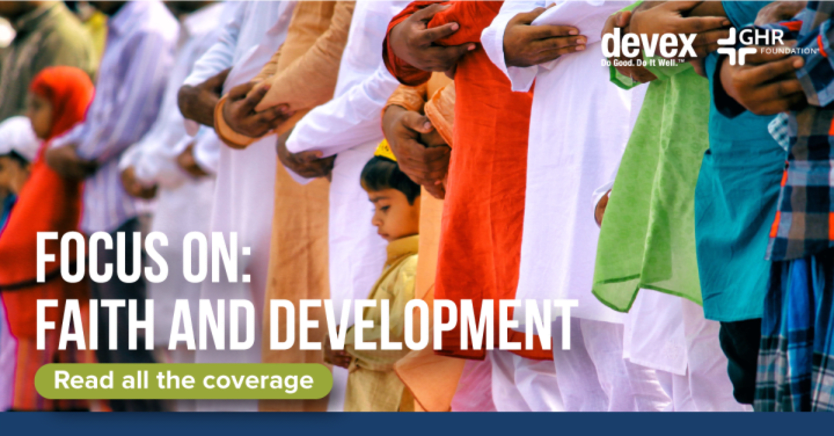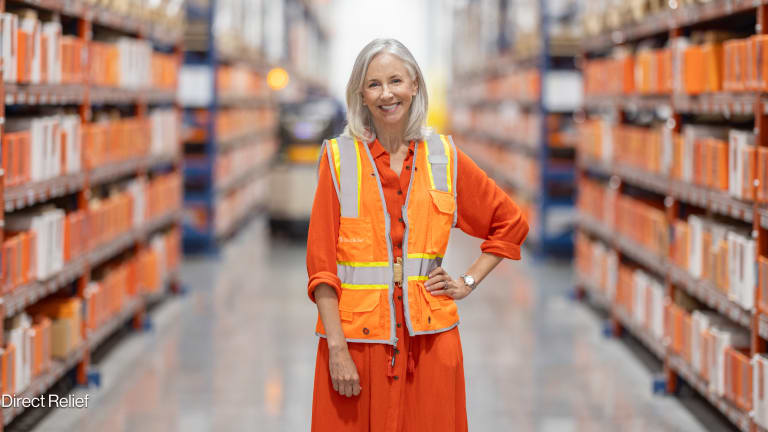Q&A: Islamic Relief CEO on faith-based fundraising during COVID-19

BURLINGTON, Vt. — While many global development organizations have seen their income and fundraising efforts suffer due to the financial fallout from the COVID-19 pandemic, Islamic Relief Worldwide finds itself in a different position.
The world’s largest Islamic charity has seen its income increase during the global crisis, largely driven by individual donors with a different perspective on giving, said Naser Haghamed, the organization’s CEO.
“I think people of faith have a different approach to giving during crisis, whether they are Muslims, Christian, Jewish, Buddhist, I think they have a different [perspective],” Haghamed told Devex.
“In Islam, you will say that you are not truly Muslim if you go with your stomach full when your neighbor is hungry,” he said, adding that people have seen the effects of lockdown and economic distress in their communities and around the world, and responded with generosity.
“National actors have a huge role to play — and maybe we have actually let them down over the years by spoon-feeding them rather than empowering them.”
— Naser Haghamed, CEO, Islamic Relief WorldwideDevex spoke to Haghamed about what COVID-19 has revealed about weaknesses in the global humanitarian system and how Islamic Relief has adapted to the restrictions and demands brought on by the pandemic.
This conversation has been edited for length and clarity.
How has the COVID-19 pandemic complicated Islamic Relief’s programs around the world?
COVID-19 has actually brought to the fore inequalities and power imbalances that existed for a long time ... We recognize that national actors have a huge role to play — and maybe we have actually let them down over the years by spoon-feeding them rather than empowering them and building their capacities.
Focus on: Faith and Development
This series illuminates the role faith actors and their communities play in strengthening global development outcomes.
I think that's very important; COVID-19 has exposed some of the weaknesses of the [international] NGOs from the global north, and obviously of governments as well, not recognizing the importance of local actors.
In the future, we should be less present in countries and more empowering local actors — national and regional actors — so that these will be the first responders. In every single country, any INGO is not present in every single part of the country. So we had to focus wherever we were working, and there was no way we could expand our work during this time, even though the help was needed everywhere.
Are you actively considering reducing Islamic Relief's footprint around the world, and instead, working more through local partners?
Yes, we are actively looking at it. We are reviewing our localization strategy and how we improve, how we make it agile as well. In the past, when we did a localization program, it was a very slow process and we were trying to make sure that we tick all the boxes in everything, and we were a bit risk-averse. But the way I have communicated with my team, and the way we want to work in the future [is] — let's be agile.
There will be certain areas we have to be very strict that we have to follow certain processes, we cannot compromise. But there will be other areas that we should, almost like trial and error, do things, and if they don't work, adjust them. But most important is to have as many partners as possible, as many local actors as possible, so that they can respond to crises themselves. And we have to focus on our key competencies and we need to look at what the competencies are.
Currently, the way many INGOs work is that we all must do A-Z work. From the initial fundraising to the advocacy to the design of the programs all the way to the delivery and monitoring and evaluation is done by the same organization ... That's not how the private sector works.
Even Apple may design their phones and their iPads, but they get somebody else to manufacture them because it's a much more efficient system. We don't do that, and we have to look at it. I think local actors have key competencies, have local knowledge, they are fast to respond. We need to enhance that competency, and let's focus on our own competency as well. We should be funding research, advocacy. Why not?
“Our U.K. operation is 40% above target by the end of August in terms of income.”
—Many organizations right now are struggling financially as a result of the economic crisis brought on by COVID-19. I understand you've actually seen an increase in donations. Is that because you rely mostly on individual donations?
We do rely on individual giving. Around 80% of our income comes from individuals. Only 20% is from institutions. In the global north — because that's where COVID-19 hit first before the global south — Western governments were panicking, and they were cutting aid, or they were suspending it or putting it on a pause, whatever name they want to call it. And sometimes they did actually cancel the contracts with INGOs, and it affected a lot of INGOs, but it didn't affect us at all because it was 20% or less. So that was the first part.
The second part — the peak of COVID-19 was during our holy month of Ramadan ... This is when Muslims are most generous — when they give during the year. And what we noticed is actually people were much more generous than usual ... People of faith, during crisis, they think of others quite heavily. You might think that some of them might have lost their jobs or their businesses were locked down, but actually, they gave more.
And this was not [just] Islamic Relief in the U.K. and in the global north ... all Muslim charities during the month of Ramadan saw an increase — anything between 30% to 100% of income. Our U.K. operation is 40% above target by the end of August in terms of income.
We had to adapt to digital fundraising because there were no mosques, there were no community events and other things. Our teams were quite creative. Within a few weeks, they managed to set up new systems and processes in terms of fundraising. Peer-to-peer fundraising in the U.K., within a month, raised half a million pounds through JustGiving ...
We are doing a lot of events using Zoom, inviting people to a virtual Iftar, a virtual opening fast. So there are a lot of creative ideas that our fundraisers use globally to make sure that we are not impacted by the lockdown, because a lot of our income comes from running events and charity dinners and so on, especially during this specific month. So I think we did well in that respect in terms of adopting our fundraising activities.
Devex, with support from our partner GHR Foundation, is exploring the intersection between faith and development. Visit the Focus on: Faith and Development page for more. Disclaimer: The views in this article do not necessarily represent the views of GHR Foundation.

Search for articles
Most Read
- 1
- 2
- 3
- 4
- 5








